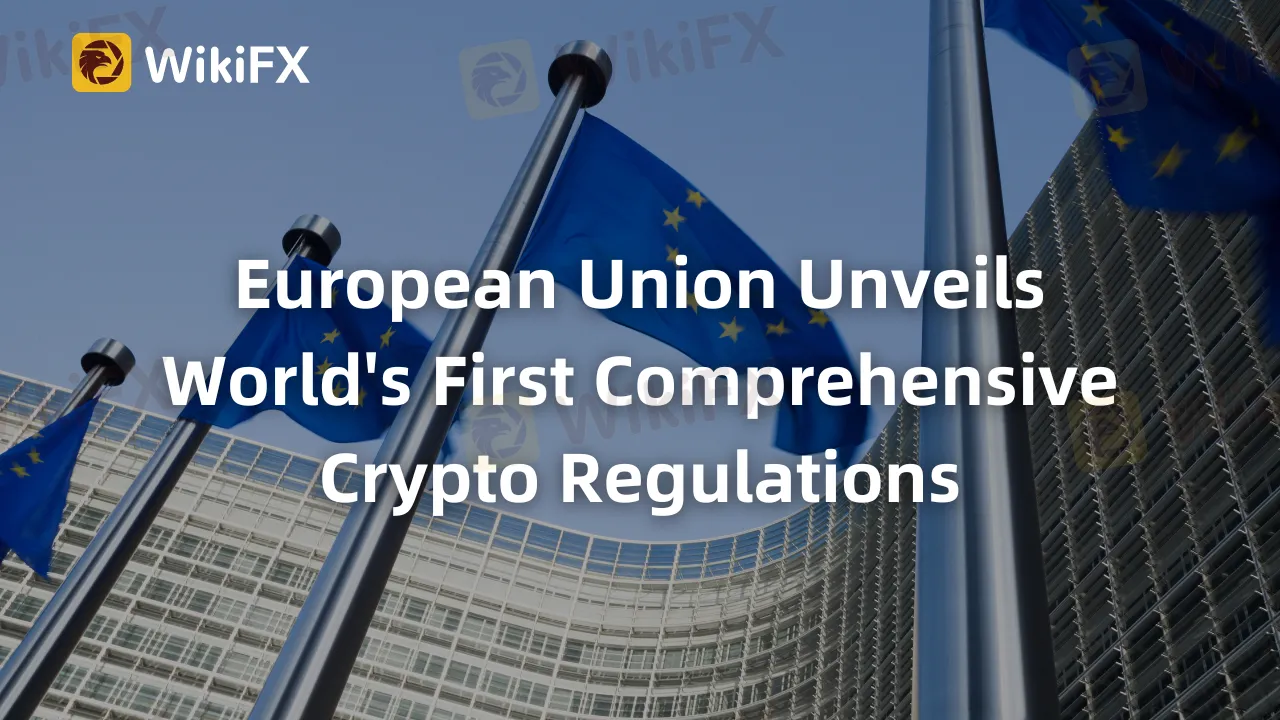简体中文
繁體中文
English
Pусский
日本語
ภาษาไทย
Tiếng Việt
Bahasa Indonesia
Español
हिन्दी
Filippiiniläinen
Français
Deutsch
Português
Türkçe
한국어
العربية
European Union Unveils World's First Comprehensive Crypto Regulations
Abstract:The European Union (EU) has endorsed the world's first comprehensive cryptocurrency regulations, requiring crypto-related firms to obtain a license. The new rules, designed to prevent money laundering and tax evasion, make crypto transactions traceable and mandate data sharing on tax rulings.

In an unprecedented move, European Union (EU) member states collectively endorsed the world's first holistic set of regulations for cryptocurrency assets on Tuesday. This pivotal decision is likely to incite countries such as the United States and the United Kingdom to accelerate their crypto regulatory efforts.
The crucial approval came during a meeting of EU finance ministers in Brussels, following a rigorous negotiation process with the European Parliament, which sanctioned these regulations in April. The urgency to regulate the crypto sector has been accentuated by the recent downfall of the FTX cryptocurrency exchange.
Elisabeth Svantesson, the Finance Minister for Sweden, which currently presides over the EU, underscored the vital importance of these regulations. “The necessity for introducing protective measures for European citizens invested in these assets and curtailing the exploitation of the crypto sector for money laundering and terrorist financing has been starkly highlighted by recent incidents,” she stated.
The newly approved regulations necessitate that any firm aiming to issue, trade, or safeguard crypto-assets, tokenized assets, and stablecoins within the 27-nation bloc obtain a license. The rules are an effort to provide a comprehensive framework for the burgeoning crypto sector, offering much-needed clarity for companies operating in this space.
In a bid to prevent tax evasion and money laundering using crypto-assets, the ministers have agreed to make these transactions more traceable. As of January 2026, service providers will be required to obtain the names of both senders and recipients involved in crypto-asset transactions, irrespective of the transaction amount.
Further, an agreement was reached on modifying the rules governing how member states cooperate on taxation matters to include transactions involving crypto-assets. This includes the exchange of information on advance tax rulings for the wealthiest individuals.
Crypto firms have long sought regulatory certainty, and the EU's move is likely to put pressure on other countries to adopt similar rules, and on global regulators to develop universal norms for cross-border transactions.
Meanwhile, the United Kingdom has proposed a phased regulatory approach, initially targeting stablecoins before expanding to un-backed crypto-assets at a later stage, though a concrete timeline is yet to be set.
The United States, on the other hand, has been focusing on the use of existing securities rules for enforcement actions in the sector while deliberating on whether to introduce specialized new rules and the bodies that would enforce them.
Hester Peirce, a commissioner at the U.S. derivatives regulator CFTC, acknowledged last week that numerous federal and state authorities are wrestling with determining their potential oversight role in the crypto sector. “We are wandering in the desert a bit,” Peirce confessed at a conference.
The EU's landmark decision on crypto regulation not only sets a new standard for the union itself but also presents a challenge to the global community to catch up. It remains to be seen how other nations will respond to this wake-up call.
Download and install the WikiFX App on your smartphone to stay updated on the latest news.
Download the App here: https://social1.onelink.me/QgET/px2b7i8n

Disclaimer:
The views in this article only represent the author's personal views, and do not constitute investment advice on this platform. This platform does not guarantee the accuracy, completeness and timeliness of the information in the article, and will not be liable for any loss caused by the use of or reliance on the information in the article.
Read more

Why More People Are Trading Online Today?
Discover why online trading is booming with tech, AI, and a push for financial freedom. From stocks to crypto, it’s a thrilling hustle for all.

High Return Traps? WikiFX’s Complete Scam-Busting Handbook to Avoid Financial Fraud!
Financial scams are evolving faster than ever, and fraudsters are getting more creative in luring victims into traps. Whether it’s promising high returns or leveraging authority to build trust, scammers continuously innovate new ways to trick investors. From clone firms to cold calling schemes, it’s essential to understand how these scams work to protect your hard-earned money. This comprehensive guide by WikiFX will help you recognize and avoid common financial scams.

Forex Explained in 60 Seconds: How It Works & Who Profits
Before diving into the forex market, it’s crucial to understand its mechanics, risks, and profit potential. Without a clear grasp of how forex operates, you risk losing money instead of making it. Here’s a concise breakdown to help you navigate this dynamic financial market.

Check Yourself: Are You Always Rushing for Trades?!
With market fluctuations happening in real-time and profits hinging on split-second decisions, many traders develop an impulse to act quickly. But have you ever stopped to ask yourself: Am I rushing into trades? If you’re constantly clicking “Buy” or “Sell” in a flurry of excitement or anxiety, you may be falling into a dangerous trap that could cost you more than you realise.
WikiFX Broker
Latest News
How Crypto Trading Transforms FX and CFD Brokerage Industry
FCA Warns Against 10 Unlicensed or Clone Firms
CySEC Warns Against 14 Unlicensed Investment Websites
Top Currency Pairs to Watch for Profit This Week - March 31, 2025
Will natural disasters have an impact on the forex market?
Philippines Deports 29 Indonesians Linked to Online Scam Syndicate in Manila
Exposing the Top 5 Scam Brokers of March 2025: A Closer Look by WikiFX
Gold Prices Climb Again – Have Investors Seized the Opportunity?
Webull Launches SMSF Investment Platform with Zero Fees
Australian Regulator Warns of Money Laundering and Fraud Risks in Crypto ATMs
Currency Calculator







